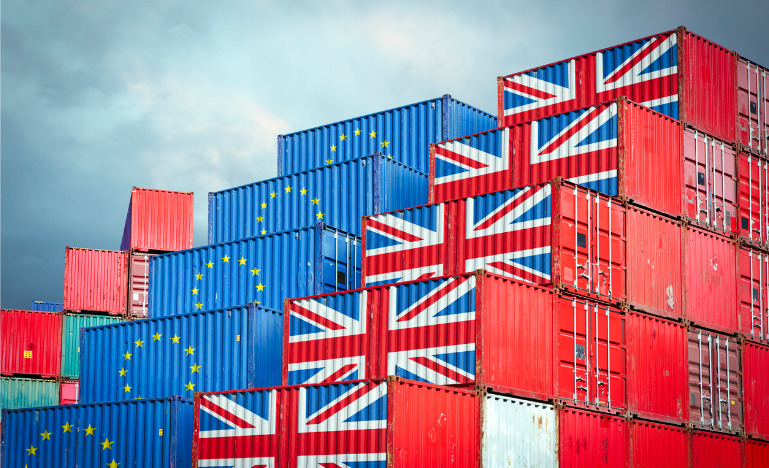Minding the gap
Canada’s deal with the UK to avoid post-Brexit tariffs still needs Parliament’s approval.

After a year like 2020, it's almost a relief to hear that something could have gone a lot worse.
The United Kingdom's slow departure from the European Union, culminating in its pullout from the customs union and single market on Dec. 31, threatened massive disruptions for trading nations like Canada, which already had pacts with the rest of the EU. As of this moment, it appears Canada has avoided dire consequences — although it may have been a near-run thing.
To avoid damage to supply chains here, the federal government needed to bridge the gap between the UK's final EU departure and the completion of a new Canada-UK trade deal to take the place of CETA, the Canada-EU pact that eliminated more than 98% of tariff lines between the trading partners.
Back in November, Ottawa and London announced an agreement in principle on a "continuity agreement" that largely applies CETA's terms to the Canada-UK trading relationship. The deal needs parliamentary approval, a process that typically takes months — but because the continuity agreement arrived too late for passage before Parliament's winter break, the enabling bill is still stuck at second reading.
So there was a lot of anxiety in business circles before the federal government announced on Dec. 22 the signing of a memorandum of understanding (MOU) carrying over CETA's terms until the continuity agreement can be ratified. Later in the month, Ottawa unveiled the United Kingdom Trade Continuity Remission Order, which allows businesses to remit the tariffs they'd otherwise have to pay on UK imports until the continuity agreement takes effect.
If the continuity agreement was a stopgap, the MOU and the remission order are stopgaps for the stopgap. Importers can breathe easier now.
"The important thing is that there is no gap," said Valerie Hughes, senior counsel at Bennett Jones in Ottawa and a specialist in international trade law.
"Except for the fact that, in three years, we'll have to have a new trade agreement with the UK, I expect it to be almost seamless."
Seamless doesn't necessarily mean flawless. Robert Glasgow, a partner in McCarthy Tetrault's International Trade and Disputes Group, said now is the time for all importers, big and small, to pay close attention to the paperwork.
"So this is something importers are going to have to be very careful about — there's a section where they have to enter in a special code to claim remission of duties, so that they can get the CETA rate," he said.
"Some may neglect to use the remission code. Some goods are in transit now that are going to be assessed duties. Importers can file a correction with the CBSA, and they have a year to do that. But what [importers] should be doing now is getting advice, consulting with a trade lawyer. Otherwise, they're going to run into problems and getting a refund is going to take many weeks."
In Canada, said Glasgow, the MOU forestalled "tariff bottlenecks, disruptions in supply, slowdowns and even shutdowns. And it probably would have been worse for smaller importers."
And by freezing the terms of Canada-UK trade in place, he added, the MOU also preserved the origin rules for EU inputs and goods in Canada-UK supply chains, preventing "massive supply shocks throughout the supply chain, with price increases all the way down the line."
Still, the timeline was nerve-wracking for the businesses that depend on the Canada-UK trading relationship. And there's still a very slim chance it could all go sideways. In a minority Parliament, no one can predict with absolute certainty how any vote will go — even a vote on something as important as the continuity agreement.
"What if the opposition declines to pass the bill? I can't see that as anything but an idle theoretical point — it would be truly astonishing if the bill did not pass," said Lawrence Herman of Herman and Associates. "But the implications for Canadian firms would be serious."
And while Canada's narrow escape from the Brexit bind might suggest that someone was asleep at the switch, Glasgow and Herman said the federal government probably did the best it could with an awkward situation.
"While Canada was trying to get one agreement ironed out with the UK, the UK was trying to do the same thing with a much larger number of trading partners," said Glasgow. "A government gets pulled in a lot of different directions in a crisis. And in this case, London may have thought that since CETA was a well-drafted agreement and Canada and the UK share a similar system of government and have a long-standing relationship, that would alleviate the risk involved in having a gap."
"I agree that this is all happening at the 11th hour," said Herman. "But the federal government has been dealing with the coronavirus crisis, while the UK government has been preoccupied with the pandemic and Brexit both.
"The ground could have been prepared for the transition; the details could have been announced earlier to give the business community a heads-up. Under the circumstances, however, I think we have to cut everyone some leeway."


